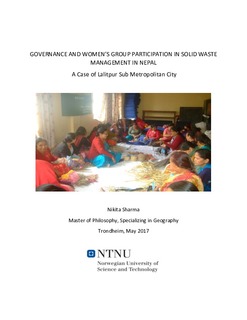Governance and women's group participation in solid waste management in Nepal : a case of Lalitpur sub metropolitan city
Master thesis
Permanent lenke
http://hdl.handle.net/11250/2506116Utgivelsesdato
2017Metadata
Vis full innførselSamlinger
- Institutt for geografi [1097]
Sammendrag
Waste Management is one of the major challenges municipalities in developing countries are facing. Municipalities in developing countries lack financial resources, technology and skills required to handle the burgeoning problem of solid waste management. This raises the issue of finding solutions to the current problems and delivering quality services to the public while facing financial and technical challenges. This study acknowledges the solid waste management system in Lalitpur Sub Metropolitan City, Nepal. The objectives of this thesis were: to describe and explain the current waste management system; to find out how governance affect the management of solid waste and recommend future solutions for a sustainable waste management system in the municipality. This is done by exploring the involvement of women’s group as a method of public participation in solid waste management.
The objectives for the study were addressed primarily through semi-structured interviews and discussions with various stakeholders along with participatory observations. The study analyzed the current solid waste management system and identified the strengths and the weaknesses of the system in the municipality.
The study identified that the current solid waste management system practiced in Lalitpur Sub Metropolitan is highly inefficient. Waste segregation is inadequate. The collection and transportation of waste is challenged by inadequacy of resources. Recycling and composting is done in comparatively small scale. Majority of the waste is dumped in landfill site which faces a number of challenges due to weak governance practices. In order to deal with the current situation, the municipality has promoted capacity building and participation of women’s group. This seems to be producing positive outcomes, though at small scale. Taking into consideration all the current issues the study makes some recommendations for developing a sustainable solid waste management system for the future. Some of these recommendations are public private partnership for improved solid waste management in the municipality, involving people for consultation with respect to solid waste management decision making process, adoption of integrated solid waste management system and most importantly improved governance and better performing public institutions. The study concludes that people especially women’s group are willing to participate and contribute towards the development of a sustainable solid waste management system. Recommendations provided by the study can be helpful to develop a system of solid waste management that can act as a model for other municipalities in the country.
